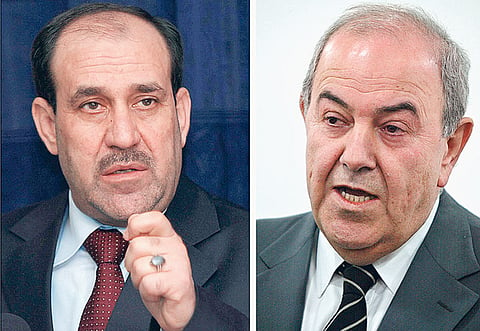Allawi and Al Maliki need to reach a deal
Iraq needs an inclusive coalition but this should not undermine the ability to govern

Iraq needs a long period under a stable government. The results of the March elections, however, gave the country a near-draw between two large parties: Eyad Allawi's Iraqiya party which got 91 seats, and the incumbent Nouri Al Maliki's State of Law with 89 seats. The resulting impasse has led to intense political negotiations between all parties, with the likely outcome being some sort of inclusive arrangement in which all leading parties get some representation.
However, negotiating a successful coalition deal is proving very hard. Finding the right combination of factions and allocating different individuals within the coalitions to different roles is not easy. This is why Allawi insisted that his Iraqiya Party has the right to form the next government, when he spoke to Gulf News last week. He was making the point that as the largest party (even if only by two votes) his Sunni and more secular platform should not be brushed aside by a more Shiite and religious alliance based on State of Law and its former allies in the coalition — the Iraqi National Alliance.
Allawi's unexpectedly strong result meant that Al Maliki lost the authority natural to the incumbent prime minister, but neither can ignore the other. Therefore it is likely that some sort of widely based coalition will be formed in the next month, but the danger is that it will be so broad that it will lose the ability to act.
The situation in Iraq needs a government that can move quickly and decisively. A prime minister has to be able to take quick decisions and be then supported by his government.
While Iraqi politics is about working with the many sects and groups that make up the totality of Iraqi society, inclusiveness should not overwhelm the ability to act.
Sign up for the Daily Briefing
Get the latest news and updates straight to your inbox



